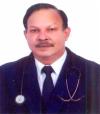Brief Answer:
ECG is suggestive of Pre-excitation syndrome
Detailed Answer:
Hi XXXXXXX
Thanks for your query.
Firstly, you have probably forgotten to uploaded ECG portion of V1-V6 due to oversight. Please do so at the earliest for my perusal.
The uploaded portion of the ECG shows a short P-R interval, presence of 'delta wave' with reciprocal T-wave inversion in II, III, and avF. These findings are suggestive of a condition called "Pre-excitation Syndrome" (or, more specifically, WPW Syndrome) and NOT ischaemic heart disease. A negative
stress ECHO substantiates my opinion.
Pre-excitation Syndrome is a congenital disorder, which usually manifests as bouts of
rapid heart rate that may present as rapid palpitations. It most often starts in early adulthood. It tends to get less frequent with passing years. In the otherwise healthy person there is probably no other feature but, where the heart and circulation are already compromised, perhaps from
coronary heart disease, this can produce angina. But, in your case, it is not angina, as the stress ECHO is negative.
The reported abnormalities of trivial TR and
diastolic dysfunction are of no particular significance.
Constant
chest pain is NOT a feature of Coronary heart disease, but is probably due to either, spasm of the chest muscles; atypical, non-angina pain associated with episodes of rapid heart rates; or, a manifestation of chronic mental stress/
anxiety state.
I would therefore recommend the following course of action:-
1. A 5-7 days' course of anti-inflammatory pain-killers will cure the pain, if it is due to spasm of chest muscles.
2. A regular course of anti-anxiety therapy will give you substantial relief, if you are passing through persistent mental stress and anxiety.
3. If you have indeed been getting episodes of rapid heart rate and palpitations,
consult a cardiologist, show him the ECG and apprise him of my opinion. I am certain he will agree with me and, put you on appropriate treatment, if he deems appropriate.
Hope I have addressed to your concerns to your complete satisfaction and you find my response helpful and informative. I will be happy to answer further queries, if any.
Fond regards and have a nice day,
Col (Dr.) Rakesh Karanwal







